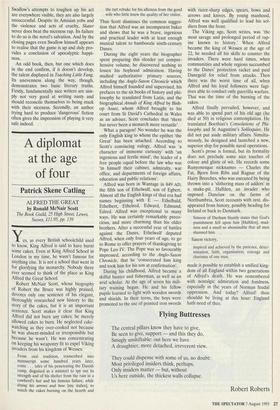A diplomat at the age of four
Patrick Skene Catling
Yes, as every British schoolchild used to know, King Alfred is said to have burnt some cakes. Even at King Alfred School in London in my time, he wasn't famous for anything else. It is not a school that went in for glorifying the monarchy. Nobody there ever seemed to think of the place as King Alfred the Great School.
Robert McNair Scott, whose biography of Robert the Bruce was highly praised, devotes only one sentence of his elegant, thoroughly researched new history to the story of the cakes, but it is an important sentence. Scott makes it clear that King Alfred did not burn any cakes; he merely allowed cakes to burn. He neglected cake- watching as they over-cooked not because he was absent-minded or irresponsible but because he wasn't. He was concentrating on keeping his weaponry fit to expel Viking invaders from his kingdom of Wessex: From oral tradition, transcribed into manuscript some hundred years later, come . . . tales of his penetrating the Danish camp, disguised as a minstrel to spy out its strength and of his shelter from the rain in a cowherd's but and his famous failure, while drying his arrows and bow [my italics], to watch the cakes burning on the hearth and
the tart rebuke for his idleness from the good wife who little knew the quality of her visitor.
Thus Scott dismisses the common sugges- tion that Alfred was an incompetent baker and shows that he was a brave, ingenious and practical leader with at least enough musical talent to bamboozle ninth-century Danes.
During the eight years the biographer spent preparing this slender yet compre- hensive volume, he discovered nothing to lessen his boyhood admiration. Having studied authoritative primary sources, including the Anglo-Saxon Chronicle which Alfred himself founded and supervised, his prefaces to the six books of history and phi- losophy he translated from Latin, and the biographical Annals of King Alfred by Bish- op Asser, whom Alfred brought to his court from St David's Cathedral in Wales as an adviser, Scott concludes that 'there has never been a monarch more versatile'.
What a paragon! No wonder he was the only English king to whom the epithet 'the Great' has been attached. According to Scott's convincing eulogy, Alfred was 'a character of immense curiosity' with 'an ingenious and fertile mind', the leader of a free people equal before the law who was `in himself their cabinet, admiralty, war office, and departments of foreign affairs, education and public relations'.
Alfred was born in Wantage in 849 AD, the fifth son of Ethelwulf, son of Egbert. Almost all the English kings of that era had names beginning with E — Ethelbald, Ethelbert, Ethelred, Edward, Edmund, Edred. Alfred was exceptional in many ways. He was certainly remarkably preco- cious, and more charming than his older brothers. After a successful year of battles against the Danes, Ethelwulf deputed Alfred, when only four years of age, to go to Rome to offer prayers of thanksgiving to Pope Leo IV. The Pope was so favourably impressed, according to the Anglo-Saxon Chronicle, that he 'consecrated him king and took him for his son at confirmation'.
During his childhood, Alfred became a skilful hunter and fisherman, as well as an avid scholar. At the age of seven his mili- tary training began. He and his fellow pupils learned to fight with wooden swords and shields. In their teens, the boys were promoted to the use of pointed iron swords with razor-sharp edges, spears, bows and arrows and knives. By young manhood, Alfred was well qualified to lead his sol- diers from the front.
The Viking age, Scott writes, was 'the most savage and prolonged period of rap- ine known to history.' When Alfred became the king of Wessex at the age of 22, he needed all his skills to counter the invaders. There were hard times, when communities and whole regions succumbed to the Danes' protection racket and paid Danegeld for relief from attacks. Then there was the worst time of all, when Alfred and his loyal followers were fugi- tives able to conduct only guerrilla warfare. That was the time of the burning of the cakes.
Alfred finally prevailed, however, and was able to spend part of his old age (he died at 50) in religious contemplation. He translated Boethius's Consolations of Phi- losophy and St Augustine's Soliloquies. He did not put aside military affairs. Simulta- neously, he designed and launched a new, superior ship for possible naval operations.
Scott's prose is formal, but its formality does not preclude some nice touches of colour and glints of wit. He records some Runyonesque nicknames — Charles the Fat, Bjorn Iron Ribs and Ragnar of the Hairy Breeches, who was executed by being thrown into a 'slithering mass of adders' in a snake-pit. Halfden, an invader who imposed Danelaw on the farms of Northumbria, Scott recounts with zest, dis- appeared from history, possibly heading for Ireland or back to Denmark.
Simeon of Durham bluntly states that God's punishment fell upon him [Halfden], mad- ness and a smell so abominable that all men shunned him.
Saxon victory,
inspired and achieved by the patience, deter- mination, faith, organisation, courage and charisma of one man,
made it possible to establish a unified king- dom of all England within two generations of Alfred's death. He was remembered with nostalgic admiration and fondness, especially in the years of Norman feudal oppression. And today? Alfred! thou shouldst be living at this hour: England hath need of thee.


















































 Previous page
Previous page